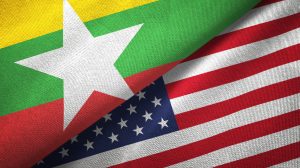As the U.S general election approaches, the one certainty is that a new president will occupy the Oval Office in January 2025, regardless of which party’s candidate wins.
Over the past three and a half years, the United States has shown limited results or influence in the Myanmar conflict. This is not entirely surprising, given the Biden administration’s tepid reactions and hands-off approach, often delegating the task to the Association of Southeast Asian Nations (ASEAN). However, this approach reflects a significant U.S. foreign policy mistake or at the very least a “strategic blind spot,” as stated by Myanmar scholar Dr. Miemie Winn Byrd.
This approach may be due to a different strategic calculus or limitations in leveraging influence in the current geopolitical context, but it does not have to be this way. In the past, especially during the Obama administration, robust U.S. engagement significantly impacted Myanmar.
U.S. policy or engagement in Myanmar typically comes from two channels: Congress and the president, who can issue executive orders without needing congressional approval.
If Vice President Kamala Harris, the Democratic candidate, is elected, the policies may not drastically differ from the current Biden administration’s – unless she makes significant changes to the Asia policy team. Kurt Campbell, previously known as the Asia czar and currently the deputy secretary of state, may likely remain in an influential position when a new Cabinet is formed. He is expected to continue engaging with all parties involved, including the State Administration Council (SAC) representing the junta, to find a peaceful solution or a soft landing. Under his watch, the United States continued its unofficial engagements with SAC officials despite public denouncements.
If Donald Trump is elected, he will likely pursue his “America First” doctrine. House Speaker Mike Johnson recently outlined the U.S. foreign policy from 2025 onwards, assuming Trump wins the presidency, in a speech at the Hudson Institute. It mirrors what Trump previously did during his first administration. Historically, Trump’s foreign policy emphasized a transactional approach, focusing on strategic interests and bilateral relations over multilateral initiatives and human rights concerns. On Myanmar, a Trump administration might adopt a less interventionist stance, potentially reducing focus on sanctions and humanitarian aid, and prioritizing direct negotiations with the junta.
It is unlikely that Myanmar will receive more attention from the U.S. under any new administration, yet there are compelling reasons for the U.S. to increase its involvement in Myanmar.
First, engaging with Myanmar’s resistance movement aligns with the overall U.S. stance of supporting democratization efforts abroad. The military regime in Myanmar ousted a democratically elected government, violently suppressed peaceful protests, and has since conducted a campaign that has seen hundreds of villages razed and more than 3 million people displaced, all to control power and siphon the nation’s wealth. The citizens and ethnic minorities of Myanmar are fighting back through an armed uprising and have established a shadow or parallel government, the National Unity Government (NUG). The United States, in its own self-image as a beacon of democracy, should seize this opportunity to support those striving for the restoration of democracy in Myanmar.
On a more strategic front, the lack of U.S. involvement is leaving a geopolitical vacuum in Myanmar for China to fill. However, Myanmar should not be overlooked in the broader context of China-U.S. relations. This is not a zero-sum game; both countries might have a mutual interest in seeing Myanmar stabilize. The ongoing turmoil in Myanmar leads to food insecurity, internally displaced people (IDP), refugees, and a humanitarian crisis that affects all the neighboring countries. The United States should recognize that removing the SAC is essential for lasting peace and prosperity in Myanmar and the region’s transition to democracies.
Ethnic minorities have long fought against successive military regimes of Myanmar, often funding their resistance through various means, including illegal activities considered by international norms. A democratic Myanmar could end these conflicts, indirectly benefiting the U.S. and other countries.
Another misconception is that a strong central power, such as the Myanmar military, is necessary to prevent the country from fracturing. However, Myanmar is already a failed state under SAC rule, and prolonging this regime only increases the suffering of its people.
Supporting Myanmar’s democracy movement would be a relatively low-cost investment for the United States. The U.S. Congress has already introduced the BURMA Act to support this cause, and the new administration – regardless of who wins – will have the authority to implement necessary measures to achieve the act’s objectives.
These could include imposing stronger sanctions on key junta businesses, providing more humanitarian aid, offering technical and non-lethal support to democratic forces as outlined in the BURMA Act, and significantly backing the NUG and ethnic armed organizations.
The establishment of the first-ever Burma Caucus in 2024 indicates that support for Myanmar’s democracy movement transcends party lines in Congress. The BURMA Act of 2022 outlines a framework for U.S. engagement with Myanmar that is likely to persist regardless of the administration in power, though its implementation may vary depending on the leadership.
Some bipartisan and perceptive U.S. senators, led by minority leader Mitch McConnell, share this proactive vision. Recently, they urged the current administration to adopt a revitalized and renewed approach toward Myanmar. Their recommendations align closely with those mentioned above.
Given the recent developments on the battlefield and the rapidly evolving situation in Myanmar, the United States should recognize that increased assistance could hasten the collapse of one of the world’s longest lasting military dictatorships, once deemed invincible. Such action would not only garner goodwill from Myanmar’s citizens but also help counteract total Chinese dominance in the region. Engaging robustly with Myanmar represents a “low-hanging fruit” for Washington to capitalize on.

































